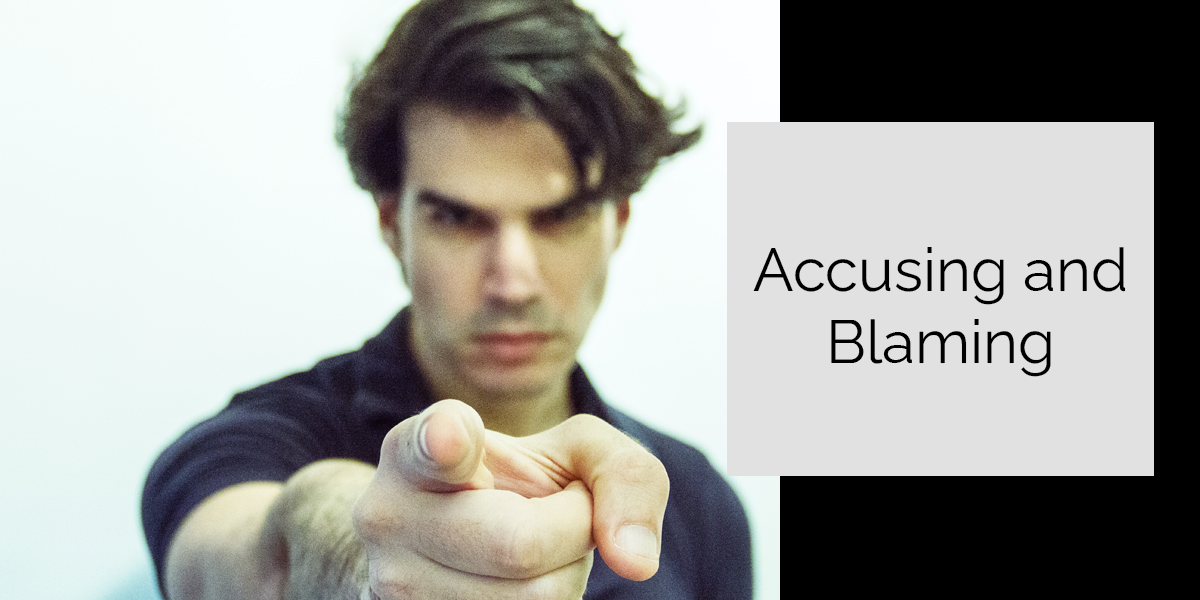What’s the Purpose of Accusing and Blaming?
Accusing and blaming help abusers take the focus off of what they’re doing and put it onto their victims. If your abuser can convincingly accuse you of “starting this whole thing” or blame you for their actions, then you’re likely to consider their viewpoint, maybe agree then try to prove your love (and condition your brain to believe you do love him) so the abuser will calm the hell down.
You love your abuser, right? It’s only natural that you would want to consider just how much of the current abuse is your fault so you can “fix it”. (Note: NONE of it is your fault. Accusing and blaming is a verbal abuse tactic used to control you!)
How My Husband Uses Accusing and Blaming
Will accuses and blames me when things don’t go his way, especially when I react to his abuse through anger or tears. I am supposed to be strong enough to take his “criticisms” without lashing out or feeling sad. According to him, I’m always overreacting and causing my own hurt. If I didn’t do X, then Y wouldn’t happen.
I’m a drama queen or “stirring the pot” (purposefully causing trouble). In short, he implies that my every reaction is a result of some lie I’ve convinced myself is true, and then set out to make his life miserable, too.
According to my husband, he’d be perfectly happy if it weren’t for me being a “sad sack” or a sorry excuse for a woman. I should be more like his grandmother and be able to take his “bad moods”.
He’s said, “I’d be pissed too if you were late for no reason, but I have a good reason! It’s part of my job!” Evidently, it’s also part of my husband’s job to stay out until 2 AM without so much as a phone call letting me know he would be late for dinner. He blamed me for his inability to respect his wife (me) because I don’t react to his late nights and drinking like his grandmother reacts to his grandpa’s drinking.
Accusing and blaming turn the victim’s bad feelings toward the abuser back onto the victim. It causes the victim to reconsider their approach or their requests of the abusive partner when, in “our” reality, the victim had every reason to bring up the issue. In the abuser’s reality, the victim steps out of line.
How to React to Accusing and Blaming
When you notice your abuser accusing and blaming you, you could say:
- “Stop blaming me.”
- “This is not my fault.”
- “I refuse to take the blame for this.”
- “I will bring this up later and we can talk about it without placing blame.”
These statements are simply statements of fact. They do not force your abuser to see your point or to end the argument. They do give you the satisfaction of staying calm and clear-headed to force responsibility back onto your partner’s shoulders.
Arguing is worse because it escalates the abuse.
Things not to say in response to accusing and blaming:
- “I wouldn’t be so upset if you would just listen to me for a minute!”
- “Oh yeah? Well, I wouldn’t have to overreact if you would talk to me nicely!”
No, no, no. Those statements blame your abuser for your reaction to the situation. This is exactly what your partner is doing to you, and no good will come of it. You are in charge of your own words and actions – make them good ones.
*Remember that these statements are to help you feel better and detach from your abuser’s antics. They do not guarantee that your abuser will stop abusing you, nor do they protect you from further abuse. You should fill out a safety plan so you know what you will do if things get out of hand.
Based on the book The Verbally Abusive Relationship: How to Recognize It and How to Respond by Patricia Evans, ISBN 1558503048, Adams Media, February 2003, and my experiences with verbal abuse.
Featured photo by Adi Goldstein
Similar Pages
- Abusive Anger
- Accusing and Blaming
- Blocking and Diverting
- Countering
- Denial
- Discounting
- Forgetting
- Judging and Criticizing
- Name-Calling Is Pure Verbal Abuse
- Ordering and Demanding
- Threatening Behavior And Words
- Trivializing
- Undermining Is Verbal Abuse
- Withholding or Depriving
- Verbal Abuse Disguised as a Joke

